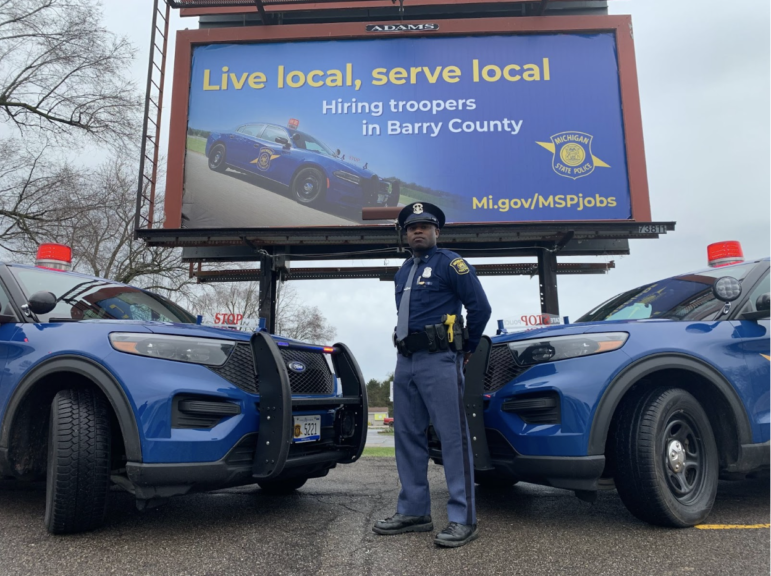
Michigan State Police
Michigan State Police promotes trooper openings through a billboard campaign, including one in Barry County, with Wayland Post Trooper Steffon Mayhue.By JACK TIMOTHY HARRISON
Capital News Service
LANSING – There is a crisis in police agency recruitment and retention, as almost every type of agency is short personnel, said Robert Stevenson, executive director of the Michigan Association of Chiefs of Police.
Many agencies are seeking to boost applications while having to operate with officer shortages.
“Since the peak of our officer employment, which was about 22,000 or so when the 911 attacks occurred, we are down about 4,000 officers in the state,” Stevenson said.
Among the reasons for this decline are smaller population pools of potential recruits, weekend hours, declining benefits and negative perceptions, police say.
Departments that are fully staffed have recruited from other agencies which creates staffing problems for smaller departments. The Michigan State Police began a lateral transfer program from local agencies, said Stevenson, previously chief of the Livonia Police Department.
The situation is the same for Michigan State Police, said Shanon Banner, its public affairs section manager.
Fifteen to 20 years ago there were several thousand applicants to run recruit schools, Banner said. That dropped to 1,200 in 2020 and then between 300 to 400 in 2022.
As more troopers have retired, it became harder to keep up with retirement, Banner said.
“While we’re maintaining applicants and still being able to hire, the applicant pool that we’re pulling from has decreased significantly over time,” Banner said. “So it is getting harder and harder to encourage people to apply.”
The Michigan Sheriffs’ Association reports that some sheriff departments are below normal staffing levels and this has led to mandated overtime, said Matthew Saxton, the association’s chief executive officer and executive director.
Since 2020, there are 600 fewer licensed law enforcement personnel due to positions not being filled, he said. The job is a 24/7 position which may cause people to look for other work.
Smaller communities, many in Northern Michigan, are especially affected by shortages, due to less benefits and options for employment within departments, Stevenson said.
These departments are more affected by these shortages because when they are missing several officers in a single-digit staff, the impact is felt more, Stevenson said.
Areas such as Petoskey, Mackinaw City, Cheboygan, lack the populations of large cities to draw law enforcement recruits from, said Harbor Springs Police Chief Kyle Knight.
“Some of the smaller agencies are really struggling up there to get fully staffed because there’s just not that many possible recruits up there,” Knight said.
The cost of living up north, especially for people fresh from the academy is difficult, but his department of seven has a sufficient pension and health care insurance benefits, Knight said.
Students going to college and coming back are helping with recruitment, and retention is strong because the quality of life up north is good, according to Knight.
Police departments, such as Petoskey, are paying for recruits to go to the academy and some departments have received grant funding, Knight said.
“I would say that’s really helped draw people up north or anywhere in law enforcement, but especially up north is to send them through the academy at our expense and not their expense, which is like a $10,000 to $12,000 bonus, plus they get paid why they’re doing it,” Knight said.
Over the years, pensions and benefits have been cut, Stevenson said, but there is some improvement in benefits returning and pay rising.
In minority communities, it is harder to get applicants and diversify because of negative media perceptions, Stevenson said.
The perception issues of all officers being called racist and the calls to end qualified immunity have also made recruitment difficult, he said. While officers may be willing to risk their lives, “they are not willing to risk their financial well-being of their family for the job,” Stevenson said.
The legislature has made some funds available for police departments to hire and pay for them to go through a police academy, according to Stevenson.
His association has promoted police jobs with videos and purchased airtime on sports radio, a new demographic of recruitment to highlight the good work of the profession.
Law enforcement is an occupation that has spanned generations of a family, Stevenson said. But more current officers are telling their children to seek other careers.
Michigan State Police is pursuing strategies to increase applications, such as creating relationships with universities, reaching returning military members and increasing digital advertising and job postings, Banner said.
State Police have started a billboard campaign to promote openings in southwest Michigan and its Explorer Program allows people as young as 14 to volunteer and engage with the community alongside troopers, Banner said.
Knight said while it is going to be difficult to fill open positions, “it is like a pendulum and I’ve been around long enough that it will turn, it is just going to take a while.”